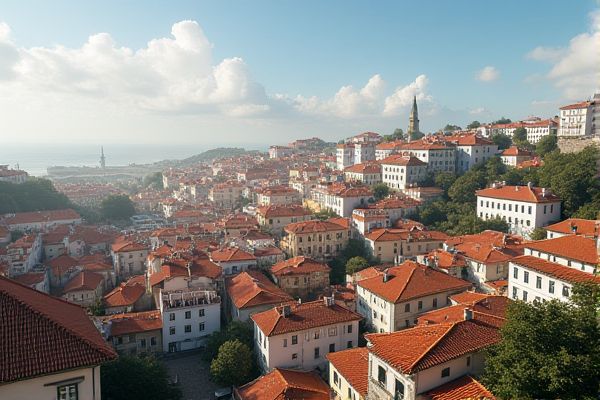
Dining and food culture in Portugal: Emphasis on fresh, local ingredients. Strong seafood tradition. Popularity of "petiscos" (tapas). Late dining hours. Importance of olive oil. Famous for Pasteis de Nata. Regional wine varieties. Bacalhau is a staple. Casual dining atmosphere. Coffee culture revolves around espresso.
Emphasis on fresh, local ingredients.
Portuguese cuisine places a strong emphasis on fresh, local ingredients, with a focus on using high-quality extra virgin olive oil, fresh herbs like parsley, mint, and thyme, and a variety of seafood such as cod, shrimp, mussels, and clams. The culture also values not wasting any ingredients, often incorporating day-old bread and other available components into dishes like Acorda, a peasant-style porridge.
Strong seafood tradition.
Portuguese cuisine is deeply rooted in its strong seafood tradition, reflecting the country's extensive coastline and historical fishing industry. Popular seafood dishes include bacalhau (dried, salted cod), grilled sardines, octopus, and various stews and rice dishes like Arroz de Marisco and Caldeirada de Peixe, with a focus on fresh, simply prepared ingredients. To explore more about these culinary delights, visit the Portuguese Cuisine resource for detailed insights.
Popularity of "petiscos" (tapas).
"Petiscos" in Portugal are highly popular, similar to Spanish tapas but with traditional Portuguese flavors, often enjoyed in a relaxed setting with friends and family, and can include a variety of regional specialties such as grilled sardines, seafood, cheeses, and cured meats. They are typically consumed before meals or during the day with a drink and are a central part of summer festivities and social gatherings. To learn more about how these delightful morsels play a significant role in Portuguese cuisine and culture, visit Portugal the Simple Life for an insightful exploration.
Late dining hours.
In Portugal, dinner typically occurs between 9pm and 10pm, reflecting the vibrant evening culture of the country. Restaurants often do not open until 7 or 8pm, accommodating the late dining habits of locals and tourists alike. On Fridays and Saturdays, dinner can be even later, sometimes extending beyond 10pm, allowing individuals to fully enjoy their weekends. To learn more about these intriguing dining customs, you can explore the [Idealista](https://www.idealista.pt/en/news/lifestyle-in-portugal/2022/03/25/4910-what-time-do-people-eat-dinner-in-portugal) website, which provides a deeper insight into the lifestyle in Portugal.
Importance of olive oil.
Olive oil is a fundamental component of Portuguese cuisine and culture, dating back to ancient Roman times. It is used in various dishes, from main courses like "Bacalhau a Bras" and "Acorda Alentejana" to desserts and cosmetics, symbolizing tradition, family, and heritage. The [Importance of Olive Oil](https://www.theportugalnews.com/news/2023-10-07/the-importance-of-olive-oil-in-portugal-a-heritage-of-flavor-and-tradition/81937) in Portugal also involves traditional production methods, including manual harvesting. Its role as a key export contributes significantly to the country's economy and culinary identity.
Famous for Pasteis de Nata.
Pasteis de Nata, or Portuguese egg tart pastries, are the most internationally renowned Portuguese dessert, invented by monks at the Jeronimos Monastery in Lisbon in the 17th century. These tarts feature flaky pastry shells filled with rich egg-yolk custard, baked until they develop dark caramelized spots, and are typically served warm with a dusting of cinnamon and powdered sugar. This delightful confection reflects the intricate culinary history of Portugal, beautifully captured on the Will Fly for Food website, showcasing a myriad of traditional Portuguese sweets that intrigue and delight food enthusiasts worldwide.
Regional wine varieties.
Portugal's wine culture is deeply rooted in its regional diversity, with notable wine regions including the Douro Valley, known for its Port and full-bodied red wines made from grapes like Touriga Nacional and Tinta Barroca; Vinho Verde, producing light, slightly effervescent whites from grapes such as Alvarinho, Loureiro, and Arinto. Other regions like Dao, Beira Atlantico, and Tras-Os-Montes each showcase their unique grape varieties and wine styles. To dive deeper into the unique wines of Portugal, explore the comprehensive insights provided in this guide on Wine Folly.
Bacalhau is a staple.
Bacalhau, or salted cod, is a staple in Portuguese cuisine, with over 1000 recipes and an annual consumption of around 1 million kilos. It is highly associated with national identity and is often served in various dishes, including traditional meals like Bacalhau a Bras and Consoada on Christmas Eve. Discover more about Portugal's culinary affinity for bacalhau by visiting Practice Portuguese, where you can find detailed insights into this beloved ingredient that forms an essential part of the nation's gastronomic heritage.
Casual dining atmosphere.
Portuguese casual dining often features a warm, rustic, and familial atmosphere, particularly in small, family-run establishments known as "tascas," which emphasize comfort, hospitality, and a relaxed, unhurried service style. These restaurants typically include traditional decor and serve dishes family-style, encouraging a social and leisurely dining experience. To explore more about this vibrant dining culture, visit the Portuguese Cuisine Wiki for a deeper dive into their food traditions and culinary offerings.
Coffee culture revolves around espresso.
In Portugal, coffee culture is deeply ingrained, with espresso being the most common drink. The average Portuguese adult drinks at least two espresso coffees a day, often socializing at cafes where they can order various types of espresso-based drinks, such as *bica* in Lisbon, *cimbalino* in Porto, or variations with milk like *pingado* or *meia de leite*. To explore this vibrant coffee tradition further, one can visit the Visit Europe website, which delves into the rich nuances of Portuguese coffee culture and its social importance.
